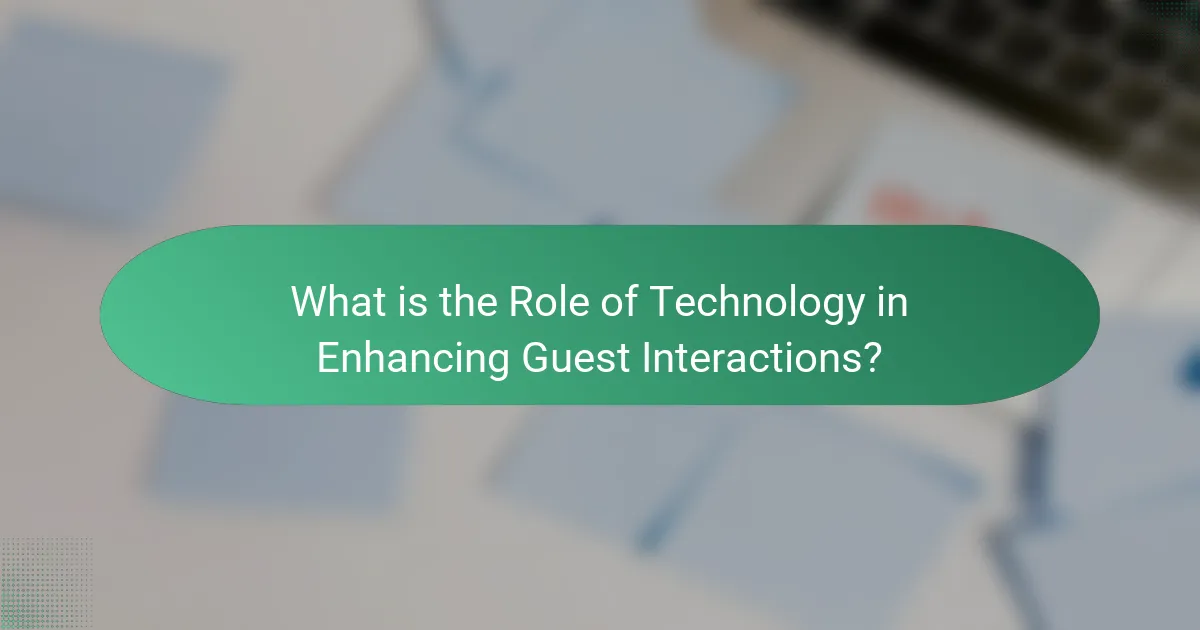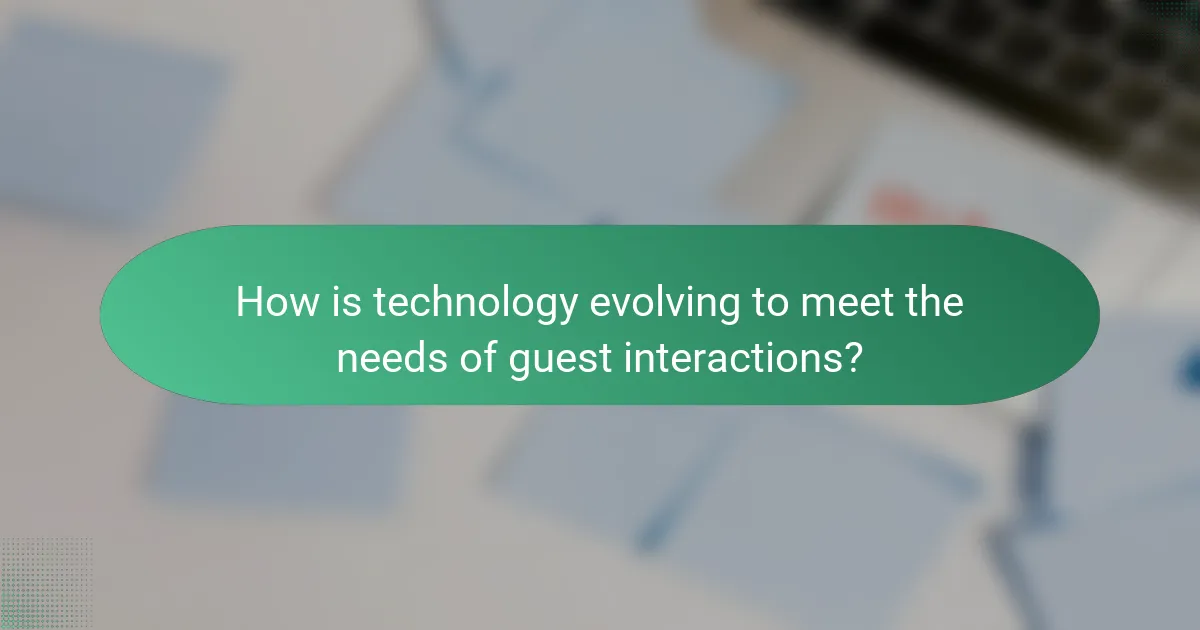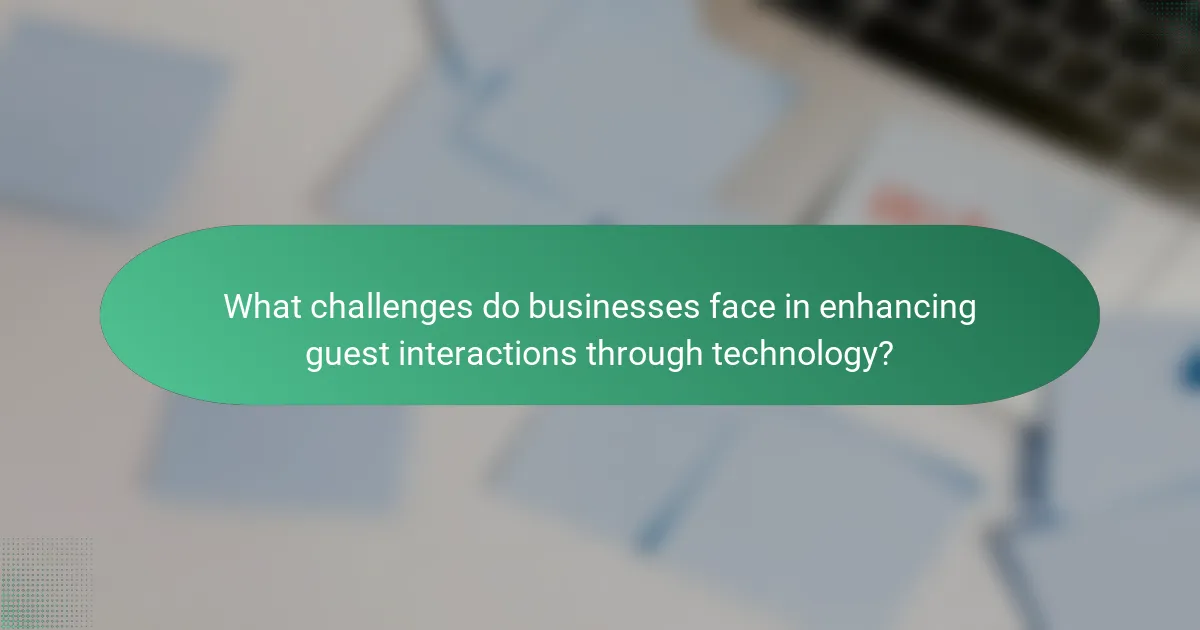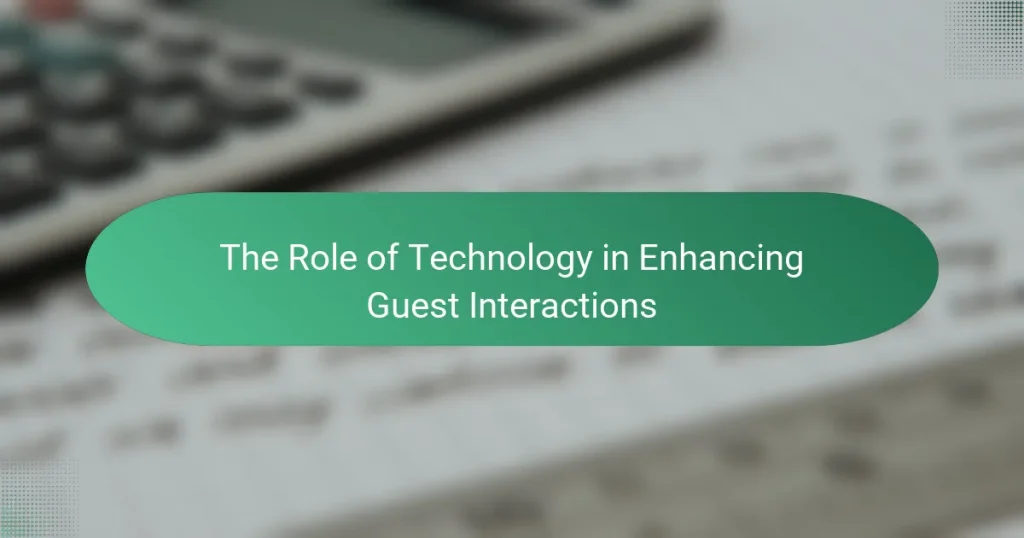Technology is a pivotal element in enhancing guest interactions within the hospitality industry. It enables seamless communication between guests and service providers through mobile applications, smart room technologies, and chatbots, which collectively improve guest satisfaction. The article explores various technological advancements, such as automated check-in kiosks, data analytics, and contactless payment options, that contribute to personalized experiences and operational efficiency. Additionally, it addresses the challenges businesses face, including system integration, data privacy concerns, staff training, and understanding guest preferences. These factors collectively influence the effectiveness of technology in transforming guest interactions and fostering loyalty.

What is the Role of Technology in Enhancing Guest Interactions?
Technology plays a crucial role in enhancing guest interactions. It facilitates seamless communication between guests and service providers. For example, mobile apps allow guests to make reservations and request services instantly. Smart room technologies enable personalized experiences, adjusting lighting and temperature according to guest preferences. Additionally, chatbots provide 24/7 assistance, answering inquiries and resolving issues promptly. According to a study by the Cornell University School of Hotel Administration, technology-driven interactions significantly improve guest satisfaction scores. This indicates that effective use of technology directly correlates with enhanced guest experiences.
How does technology facilitate guest interactions in various industries?
Technology facilitates guest interactions across various industries by enabling seamless communication and personalized experiences. In the hospitality sector, mobile apps allow guests to check-in, access room keys, and request services from their smartphones. Restaurants use digital menus and online reservation systems to streamline ordering and enhance customer convenience. Retailers implement chatbots to assist customers with inquiries in real-time, improving service efficiency. In tourism, virtual reality offers immersive previews of destinations, enhancing decision-making for travelers. A study by McKinsey found that companies leveraging technology to personalize customer interactions can increase engagement by up to 20%. These advancements illustrate the significant impact of technology on enhancing guest interactions.
What types of technology are commonly used to enhance guest interactions?
Common technologies used to enhance guest interactions include mobile apps, chatbots, and contactless payment systems. Mobile apps provide guests with easy access to services and information. They allow for room service orders, booking management, and local guides. Chatbots offer instant customer support through messaging platforms. They can answer frequently asked questions and assist with reservations. Contactless payment systems streamline transactions, improving convenience and safety. These technologies create a more personalized and efficient guest experience. Research shows that 70% of guests prefer using mobile apps for service requests.
How do these technologies improve the overall guest experience?
Technologies improve the overall guest experience by streamlining interactions and enhancing convenience. Mobile check-in and digital room keys reduce wait times at reception. Smart room controls allow guests to personalize their environment easily. Chatbots provide instant assistance, answering queries 24/7. Data analytics help tailor services to individual preferences, increasing satisfaction. Contactless payment options enhance safety and speed during transactions. Virtual concierge services offer personalized recommendations, improving guest engagement. Overall, these technologies create a seamless and enjoyable experience for guests.
What are the key benefits of using technology to enhance guest interactions?
Technology enhances guest interactions by improving communication, personalization, and efficiency. Enhanced communication allows for real-time updates and feedback. Personalization creates tailored experiences based on guest preferences. Efficient processes reduce wait times and streamline check-ins. According to a study by Cornell University, hotels that implemented technology saw a 20% increase in guest satisfaction. Furthermore, 70% of guests prefer mobile apps for service requests. These benefits collectively lead to increased loyalty and repeat visits.
How does technology increase guest satisfaction and loyalty?
Technology increases guest satisfaction and loyalty through personalized experiences and efficient service. Personalized communication fosters a connection between guests and service providers. For instance, hotels can use data analytics to tailor recommendations based on previous stays. Efficient service is achieved through online check-in and mobile apps, reducing wait times. According to a study by Deloitte, 65% of consumers prefer brands that offer personalized experiences. Additionally, technology enables real-time feedback collection, allowing businesses to address issues promptly. This responsiveness enhances trust and loyalty among guests. Overall, technology streamlines operations and enriches guest interactions, leading to higher satisfaction and repeat visits.
What impact does technology have on operational efficiency in guest services?
Technology significantly enhances operational efficiency in guest services. It streamlines processes such as check-in and check-out. Automated systems reduce wait times for guests. Online booking platforms allow for real-time reservations. Mobile apps facilitate communication between guests and staff. Data analytics improve service personalization and decision-making. According to a study by Deloitte, hotels using technology saw a 20% increase in operational efficiency. This demonstrates the tangible benefits of technology in the guest services sector.

How is technology evolving to meet the needs of guest interactions?
Technology is evolving to enhance guest interactions through automation and personalization. Automated check-in kiosks streamline the arrival process. Mobile apps provide guests with instant access to services and information. Chatbots offer 24/7 support for inquiries and reservations. Data analytics helps businesses understand guest preferences and tailor experiences. Voice-activated devices in rooms enhance convenience and accessibility. Contactless payment options improve safety and efficiency. These advancements lead to increased guest satisfaction and loyalty. The hospitality industry is increasingly adopting these technologies to remain competitive.
What are the latest trends in technology for enhancing guest interactions?
The latest trends in technology for enhancing guest interactions include the use of artificial intelligence (AI) and chatbots. These technologies facilitate instant communication and personalized experiences for guests. Mobile apps are also trending, allowing guests to access services easily from their smartphones. Contactless technology is gaining popularity, enabling seamless check-ins and payments without physical interaction. Virtual reality (VR) and augmented reality (AR) enhance guest experiences by providing immersive tours and interactive features. Data analytics plays a crucial role by helping businesses understand guest preferences and tailor services accordingly. According to a 2023 report by Statista, 70% of hotels are investing in AI to improve customer service and engagement. These trends collectively aim to create a more efficient and enjoyable experience for guests.
How are mobile applications changing the way guests interact with services?
Mobile applications are transforming guest interactions with services by providing instant access and personalized experiences. Guests can now book services, order food, and request assistance through their smartphones. This convenience enhances user satisfaction and engagement. Applications allow for real-time communication with service providers, improving response times. Data analytics in apps help tailor services to individual preferences. A study by the American Hotel and Lodging Educational Institute found that 75% of guests prefer mobile check-in options. This shift indicates a growing reliance on technology in the hospitality industry. Overall, mobile applications streamline processes and enhance the overall guest experience.
What role does artificial intelligence play in personalizing guest experiences?
Artificial intelligence plays a crucial role in personalizing guest experiences. It analyzes data from previous interactions to tailor services. AI can predict guest preferences based on past behavior. This allows businesses to offer customized recommendations. For instance, hotels can suggest room types or amenities suited to individual tastes. AI chatbots provide instant assistance, enhancing communication. According to a study by McKinsey, 70% of consumers prefer personalized experiences. This statistic highlights the importance of AI in meeting guest expectations. AI’s ability to learn and adapt improves overall satisfaction.
How can businesses effectively implement technology to enhance guest interactions?
Businesses can effectively implement technology to enhance guest interactions by integrating user-friendly digital tools. These tools include mobile apps for easy booking and check-in processes. They can also utilize customer relationship management (CRM) systems to personalize guest experiences. Implementing chatbots for instant communication can address guest inquiries promptly. Furthermore, businesses can leverage data analytics to understand guest preferences better. This allows for tailored marketing strategies that resonate with individual guests. According to a study by Deloitte, 62% of consumers prefer businesses that offer personalized experiences. This data supports the effectiveness of technology in improving guest interactions.
What strategies should businesses adopt for successful technology integration?
Businesses should adopt a structured approach for successful technology integration. This includes assessing current technology needs and aligning them with business goals. Conducting a thorough analysis of existing systems is crucial. Training employees on new technologies enhances adoption rates. Engaging stakeholders in the integration process fosters collaboration. Establishing clear communication channels ensures everyone is informed. Monitoring and evaluating technology performance helps identify areas for improvement. According to a study by McKinsey, organizations that prioritize these strategies see a 30% increase in operational efficiency.
How can staff be trained to utilize technology effectively in guest interactions?
Staff can be trained to utilize technology effectively in guest interactions through structured training programs. These programs should include hands-on workshops that allow staff to practice using technology tools in real scenarios. Regular training sessions can reinforce skills and introduce new technologies. Providing access to user manuals and online resources can help staff troubleshoot issues independently. Role-playing exercises can simulate guest interactions, enhancing confidence in technology use. Feedback sessions can identify areas for improvement and celebrate successes. Data shows that organizations with ongoing technology training see a 20% increase in customer satisfaction. This evidence supports the importance of comprehensive training in improving guest interactions.

What challenges do businesses face in enhancing guest interactions through technology?
Businesses face several challenges in enhancing guest interactions through technology. One major challenge is integrating new technologies with existing systems. Many businesses use outdated systems that are not compatible with modern solutions. This can lead to inefficiencies and increased costs. Another challenge is ensuring data privacy and security. Guests are increasingly concerned about how their personal information is handled. Businesses must comply with regulations like GDPR, which adds complexity. Additionally, training staff to use new technologies effectively is often a hurdle. Employees may resist adopting new tools without proper training and support. Finally, understanding guest preferences and behaviors through technology can be difficult. Businesses need to analyze data effectively to tailor interactions, which requires advanced analytics capabilities. These challenges collectively hinder the potential benefits of technology in enhancing guest interactions.
What are common obstacles in adopting new technologies for guest interactions?
Common obstacles in adopting new technologies for guest interactions include high costs, resistance to change, and lack of training. High costs can deter businesses from investing in new systems. Resistance to change often stems from employees’ comfort with existing processes. Lack of training leads to underutilization of new technologies. Additionally, integration issues with legacy systems can complicate adoption. Data privacy concerns may also hinder technology implementation. These factors collectively impact the efficiency of guest interactions.
How can businesses overcome resistance to technology adoption among staff?
Businesses can overcome resistance to technology adoption among staff by implementing effective change management strategies. First, they should communicate the benefits of the technology clearly. This includes how it enhances work efficiency and improves guest interactions. Training programs should be provided to ensure staff feel confident using the new technology. Engaging employees in the decision-making process fosters ownership and reduces resistance. Regular feedback sessions can address concerns and adapt the technology to meet staff needs. According to a study by Prosci, organizations that actively manage change see a 70% success rate in technology adoption.
What privacy concerns should be considered when implementing technology for guest interactions?
Privacy concerns when implementing technology for guest interactions include data collection, storage, and sharing. Guests may not be aware of what personal information is being collected. This can lead to feelings of mistrust if data usage is not transparent. Additionally, data breaches pose a significant risk, potentially exposing sensitive guest information. Compliance with privacy regulations, such as GDPR, is essential to avoid legal repercussions. The potential for unauthorized access to guest data also raises security concerns. Furthermore, the misuse of collected data for marketing purposes can lead to negative guest experiences. Addressing these concerns is crucial for fostering trust and ensuring compliance in guest interactions.
What best practices can be followed to maximize the impact of technology on guest interactions?
Implementing user-friendly technology maximizes the impact on guest interactions. Streamlined interfaces enhance guest engagement. Personalization through data analytics improves guest experiences. Real-time communication tools foster immediate interaction. Feedback mechanisms allow for quick adjustments to services. Training staff on technology use ensures effective implementation. Regular updates to technology keep it relevant and effective. Data security measures build guest trust in technology.
How can feedback be utilized to improve technology-driven guest interactions?
Feedback can be utilized to improve technology-driven guest interactions by identifying areas for enhancement. Collecting guest feedback through surveys or digital platforms provides valuable insights. Analyzing this feedback reveals common pain points and preferences. Implementing changes based on feedback can enhance user experience. For example, if guests report difficulties with a mobile app, developers can address these issues. Regular updates based on guest input ensure the technology evolves with user needs. Studies show that businesses that act on feedback can increase customer satisfaction by up to 20%. This approach fosters a more responsive and engaging guest interaction experience.
What are the most effective ways to measure the success of technology in enhancing guest interactions?
The most effective ways to measure the success of technology in enhancing guest interactions include analyzing guest feedback, tracking engagement metrics, and evaluating operational efficiency. Guest feedback can be gathered through surveys and reviews. This data provides insights into guest satisfaction and areas for improvement. Engagement metrics, such as app usage rates and social media interactions, indicate how technology is facilitating guest connections. Operational efficiency can be assessed by measuring time savings and resource allocation improvements due to technology implementation. For instance, a study by Cornell University found that 70% of guests prefer using mobile apps for check-in, indicating a positive trend in technology adoption.
The main entity of the article is technology and its role in enhancing guest interactions across various industries, particularly in hospitality. The article explores how technology facilitates seamless communication, personalization, and operational efficiency, leading to improved guest satisfaction and loyalty. Key technologies discussed include mobile apps, chatbots, and data analytics, which streamline processes and tailor experiences to individual preferences. Additionally, the article addresses challenges businesses face in adopting technology and offers best practices for maximizing its impact on guest interactions. Overall, it highlights the significant benefits of leveraging technology to enhance the guest experience.




